Saturday, 01 March 2025
Organic supermarkets may introduce a larger audience to sustainable organic produce and thus spare the environment, but do not necessarily help to reduce the amount of one-way packaging, save plastics. As a conscious consumer you will without doubt prefer non-prepackaged fruit and veges, available from all organic groceries, supermarkets and market boothes, and hand your bag over the bakery counter, making it verbally clear that you do not need a paper bag, to avoid paper waste when buying bread and rolls.
You're also safe if you restrict your shopping of dairy products, juices and soft drinks to returnable glass bottles. Some organic shops (such as Vollcorner) offer a small selection of wine in deposit bottles. Since 2021 we also have seen the gradual arrival of dry food, preserves and spreads in returnable glasses formerly only used for yogurts.
Starting in 2017 the more dedicated organic supermarket chains have been introducing measures to reduce packaging and allow customers to bring their own containers to fill with selected goods.
Unless stated otherwise all shops mentioned in this post will help you out with clean and empty reusable glass jars or organic cotton bags which you – depending on the shop – can either buy or lend if you forgot to bring your own.
Package-free food and household necessities
Early in 2016 the city's first crowd-funded vegetarian zero-waste supermarket Ohne ("without") opened its doors, followed by a
second branch early in 2019. End of June 2023
this became history: The insolvency, following the closing of other independent
owner-run package-free supermarkets earlier that year, left the Eastern,
Northern and central neighbourhoods without a place to effortlessly replenish
store cupboards without producing package waste.
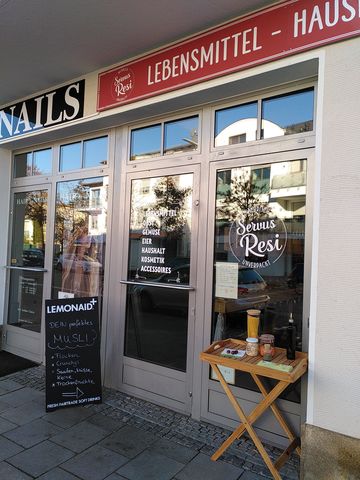
Gone the days of the pandemic spring and summer of 2020 when zero-waste groceries were blooming in town: Approximately at the same time as the Westend got its (now closed) neighbourhood shop, Servus Resi opened in Obersendling right before the lockdown in March 2020, in a non-descript middle of no-where near the Siemenswerke former industrial area. Don't let you fool by the uninviting environment at a noisy car road – what you'll find here is a busy neighbourhood gem nicely furnished in light wood, with a superb selection of dried herbs and spices aside the usual dry food, and a nicely arranged selection of household items. The greengrocery section is rather limited – local organic apples and potatoes in late autumn 2020 –, and there are no dairy or other food requiring cooling, but the shop offers both, liquid body care products and household chemicals from refill stations. Everything is supervised by the friendly shop-owner, Chrissy (not Resi) herself, and if you wish to get in touch with people from the neighbourhood take the burden to come here even from other parts of town.
In Laim Nebenan unverpackt ("package-free next door") followed in summer 2020. The latter is organised as a co-operative (though the location next to a co-operative bank is purely accidental) and sports a
small neighbourhood coffee place. They offer a very good selection of dry food, fresh fruit and veges, but less dried herbs and spices and no spirits. You can however buy wine and their selction of condiments and preserves in one-way glasses have the effect that you can do all the regular daily shopping here in one place if you don't come with more advanced expectations.
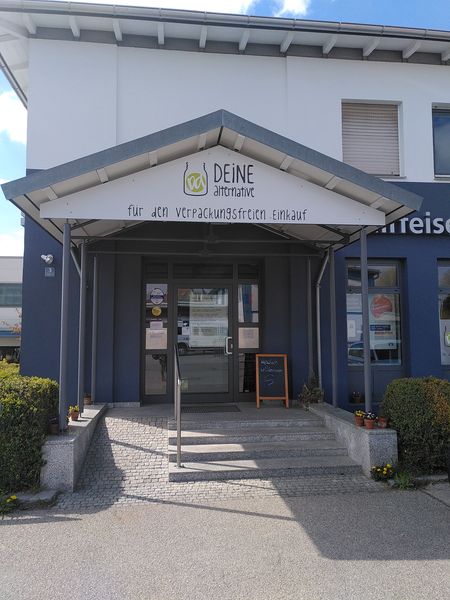
Half a year earlier, in January, 2020 another
co-operative, Deine Alternative ("your alternative") in Zorneding, opened on the premises of the former Raiffeisen co-operative bank, just a few steps from the urban train station.
When you get inside you will however immediately forget about its past as a bank, the shop is carefully and pleasantly decorated, with wooden furniture and equipped with a proper Italian coffee machine for a break in between. Most of the often local produce sold here is organically certified or at minimum sustainably produced, though it would be nice if conventional loose-weight products were clearly marked. In addition to the gravity bins and containers with dry food there's a decent selection of dried herbs and spices, sweets, bread, some confectionery, a small selection of fresh organic greens and veges, cheese and milk from the Nirschlhof organic farm (but interestingly enough no whole-meal flour or oils, vinegars or spirits by the litre). In a separate room you can buy toiletries, household chemicals and items supporting a zero-waste lifestyle. Everyone is welcome, but members of the co-operative pay less.
North of Zorneding, in the municipality of Poing, the co-operative
Bunte Bohne ("coloured/colourful bean") with its zero-waste supermarket cum cafe has been surviving hard times, but starting March 1st, 2025 every first Saturday of a month the place turns into a evening open bar where you can mingle with locals.
The neighbourhood of Trudering (a more than 1200 years old former village and suburb in the Eastern part of Munich) does not have a dedicated zero waste supermarket, but twice a month, on Tuesday afternoons, an indoor farmer's market dubbed Tante Trude ("Auntie Trudie") keeps popping up in the neighborhood associations' offices. Organic farmers offer local produce, and you can donate to the Trudelade project: home-cooked jam made from abandoned fruit trees in the neighbourhood (you'll get a jar as reward).
South-South-West of Munich, the city of Wolfratshausen (the endpoint of the S7 urban train) likewise sports a package-free shop centrally located at the Obermarkt market place: Ohnverpackt, another zero-waste shop opening within the corona lockdown in the spring of 2020,
is even certified organic. The few conventional products of regional origin are clearly marked as an exception. It does not only offer the usual dry food and household chemicals, but also a good selection of cheese and antipasti. What you won't find are fresh fruits and veges, meat and sausages.
There's a small day cafe, unfortunately all closed on Mondays.
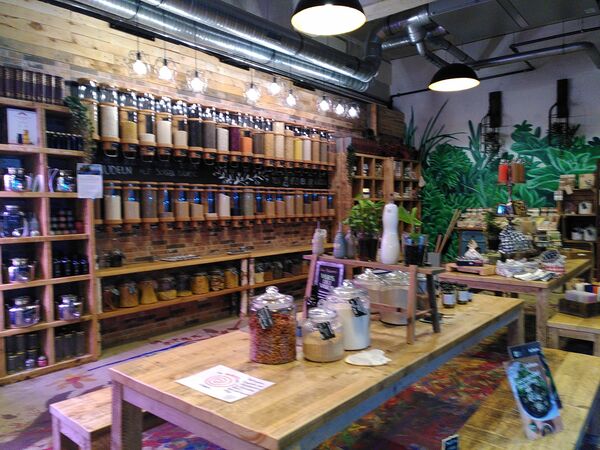
South of Munich, directly located at the S-Bahn station of Neubiberg the owner of the conventional Edeka supermarket opened a side project next door,
Hertscheck Unpacked. Unfortunately the separate organic shop concept did not survive, but is being continued as a shop-in-shop inside the conventional supermarket.
For city dwellers the place may be a destination on
a bicycle ride through the beautiful eco park Umweltgarten Neubiberg where an organic farmer's market is held on Thursday afternoons. Fun fact: The former premises of the Edeka supermarket now host a Vollcorner organic supermarket.
In smaller municipalities, (urban) train stations usually are the only public (and sustainable) transport hub and as such a natural place for zero-waste supermarkets. So I was glad to find a new (in 2022) co-operatively organised organic zero-waste supermarket in Unterföhrung, next to the S-Bahn train station. The shop dubbed
UFG (short for "unverpackt, fair, gemeinsam" – "unpacked, fair, together")
is open to everyone, with a 10 percent discount scheme for members.
It does not only offer dry food, condiments and household items, but also bread, rolls, cakes, dairy products and fresh, predominantly local fruits and veges. On Thursday afternoons you also may buy local organic meat and sausages, cheese and other fresh artisanal organic products from a mobile booth of the Tagwerk co-operative.
There's a small lunch cafe offering organic soups, quiches and sandwiches as well as cereal bowls, coffee, smoothies, tea and cake, all vegetarian, often vegan. Unfortunately you have to register with an app service to take your food with you in a returnable bowl or box, and nevertheless may have to come back to the shop to return it. So better bring your own boxes.
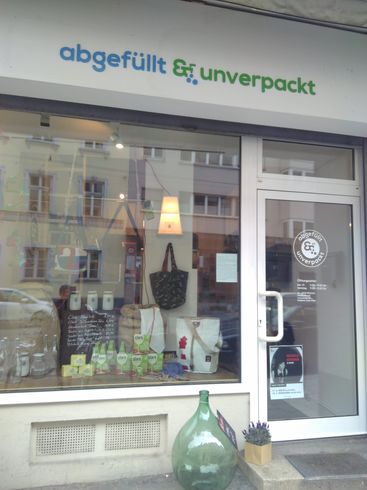
Plastic-free household
In March 2019 a tiny neighbourhood shop specializing in natural home cleaning opened in the Glockenbach neighbourhood: At Abgefüllt & unverpackt ("bottled and unpacked") the singer of the Munich-based band "Cat Sun Flower" warmly welcomes customers and passers-by and helps to (re)fill empty bottles with organic liquid household detergents. At the time of writing this shop was the only one in Munich selling washing powder by weight. In addition there are eco-friendly dishwasher tabs, body and hair soaps, fairly traded natural facecream in returnable glasses, towels, as well as upcycled and fairly traded bags and toiletry accessories.
Supermarket chains
In autumn 2016 the local Vollcorner
supermarkets received an official permit by the Munich Department of Public Order (Kreisverwaltungsreferat) to fill customers' jars and boxes with
cheese, antipasti, processed meat products or cake. Most independent convenience stores will also do this on request. Vollcorner, Lebascha and others provide jars, usually for a deposit. So even if you forgot to bring your containers, take your courage and ask!
The Herrmannsdorfer groceries (e.g. the one at Max-Weber-Platz) even reward you with a few cents discount per saved packaging.
To avoid misunderstandings it is advisable to clearly point to your box (or ask for the deposit container) before placing your order at the sales counter and tell the staff to tape the receipt to it.
The shops of the nation-wide operating Alnatura chain never offered refill dispensers. However, it has been increasing the range of products in returnable jars and bottles continously since 2021 – among others fairly traded nut butters, a number of dry products and even ketchup.
A small selection of dried fruits and nuts in refundable glasses as well as package-free toilet paper can be obtained from Vollcorner supermarkets. Their huge flagship store at Theresienwiese (with butcher's counter and lunch cafe) also experimented with a milk vending machine and a dedicated shelf offering all sorts of products in deposit glasses, but both efforts were discontinued due to low customer demand.
By the end of 2020 a number of conventional supermarket chains had introduced refill stations for dry food, too, but since you still have to do a lot of careful reading in front of the shelves to shop climate-friendly products, I won't mention them here, with one exception: the huge Tegut branch that opened in the Elisenhof shopping centre next to the main train station
in December 2020. This supermarket chain gives their customers a choice – all organic products are easily to recognise thanks to a light-green label on the shelves, and there's a great number of them in all product categories. Given the sheer number of products on sale the impressive refill rack at the left-hand side of the entrance aisle comprises only a negligible fraction of total sales, but it's a good start, and the best: All products in the gravity bins are organic. Come here for the biggest selection of package-free organic chocolate-covered sweets I've come across so far. There are grains, cereals, nuts, dried fruit, legumes and sweets, but no flour and surprisingly almost no pasta.
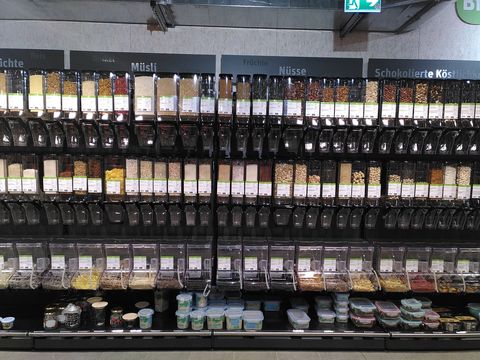
Although the supermarket has its entrance in the Hauptbahnhof basement Tegut is closed on Sundays and public holidays as well as in the evening. When you have at minimum half an hour to change trains you will however reach to refill some of your dry food containers as long as you know how it works: Put your box onto the scales and choose "Tara-Bon". This will print a label. Fill the box and remember the product id on the lower end of the gravity bin. Put the filled box back on the scales and press the second "Bon" button beneath the "Tara-Bon" button. Now you will be asked to type in the product id. Scan the bar code on the previously printed label with the hand scanner, and there you go: A receipt with a price tag will be printed for you. Seal your box with this second label and hurry up to the cash counter.
Until the end of 2022 Basic supermarkets had gravity bin dispensers for pasta, nuts, dried fruit, sweets, grains and more which all disappeared in the course of the company's
insolvency and take-over by the "teGut" chain. Package-free offerings at the remaining "Basic" branches are reduced to fruits and vegetables as well as food from the serviced bakery and butchers' counters.
Neighbourhood groceries
In Haidhausen the Lebascha neighbourhood grocery has been offering to fill all loose-weight products (cakes and bread, eggs, cheeses, olives, jelly gums and liquorice – note that the latter is not organic) in bottles, jars and boxes customers brought along. When the shop was taken over by the Ökoesel co-operative dispensers for grains, nuts and the like as well as household chemicals were added, and you can
buy all types of dried herbs and spices by the gram.
Ask for a deposit box in case you forgot to bring your own.
For home-made dried fruit stroll a few more steps down the street and see whether the Haidhauser Oase is open (which however is rarely the case).
Household chemicals can be refilled at the Echt Bio Markt in Neuschwabing.
In Harlaching, the
independent Biowelt supermarket has a small zero-waste corner with dispensers for dry food, a good selection of loose-weight dried fruit and a dairy and butchers' counter where you can hand over your containers.
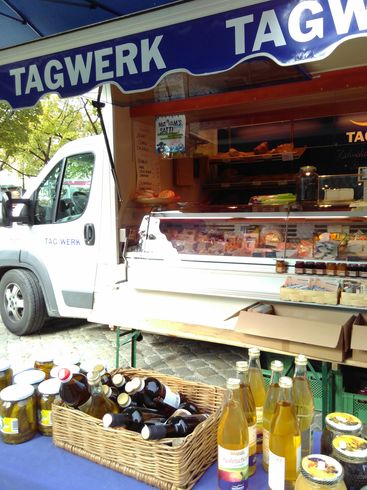
Farmers' markets
Once, sometimes twice a week farmers' markets are installed in many Munich neighbourhoods. Loose fruits and veges prevail here, and boothes selling organic produce (watch carefully for "bio" and "demeter" logos) will usually fill bread, cakes and pastries, antipasti, meat and dairy products into the containers you present. Notably at the boothes of the Tagwerk co-operative and the Hofbäckerei Steingraber you may be surprised to see that you're not the only one coming with her own boxes and jars.
On Saturday mornings you can find them next to the West-facing entry of Mariahilf church, in the neighbourhood of Au. Before the covid-19 pandemics all boothes (except the French fish monger) in the market block next to the church, right below the carillon, were organic,
but now it's no longer that easy. Therefore a comprehensive list: There are three organic market gardens (Biogärtnerei an der Isen alias Avanti Andi, Demeterhof Fahrenzhausen alias O'is bio and a third one also selling flowers and seedlings which you will immediately recognise when greeted with a friendly French accent). Put differently: Simply avoid the biggest greengrocery booth, "Helminger".
For meat, sausages, cheese and other dairy products there are the aforementioned two producers, and in addition the farm sale of Bergwinklhof Monigottsöd. The latter also offers a small selection of wine, but for good and knowledgeable advise on wines or non-alcoholic drinks to accompany a meal you'll better pay a visit to Uli Scheffler's organic wine trader's booth. While the juices are readly available in deposit bottles, returnable wine bottles are still very rare, and not used for high-quality wines.
If you feel adventurous on Thursday afternoons take the urban train S7 in direction Aying/Höhenkirchen-Siegertsbrunn/Kreuzstraße (or a bike ride) to the suburb of Neubiberg and pay a visit to the communal organic market on the pleasant premises of the Umweltgarten eco park, a true oasis within ugly suburbanity, with a small zoo, popular not only among kids. On Thursdays there's also an all-day market at Rotkreuzplatz. As on Mariahilfsplatz about half the boothes here are organic, though scattered all over the market area, with a cluster in direction Nymphenburger Straße.
Needless to say that the organic boothes on the famous Viktualienmarkt in the Munich city will happily support you when you make it clear that you want to use your own bags and containers. And the spring of 2021 did not only see the opening of an organic bakery in one of the solid market stalls in the northern part of the market, but also a tiny organic food shop for organic dry food grown and produced in the nearby Chiemgau region:
Satt und gut ("full and good") sells staple foods like grains, flour, eggs, honey and oil but also cookies, both pre-packaged and loose weight, partially from the smallest gravity bins I've seen so far. Note that this shop, unlike the market itself, is closed on Mondays
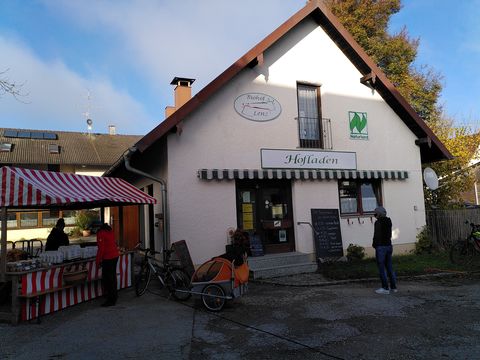
In Zorneding a small farmers' market is being held every Friday on the premises of the Biohof Lenz organic farm. Here you can buy local organic meat and meat products, cheese, bread, veges, and occasionally honey and bee products, wines and spirits. Although most stalls are organic there are a few exceptions offering conventionally produced specialities. The Lenz family's own farm shop keeps open at the same time and on Saturdays, but for buying their exceptionally good meat you should subscribe to their newsletter and order beforehand according to availability (you should be fast to answer). Unfortunately all the Lenz meat and sausages are vacuumized in plastic.
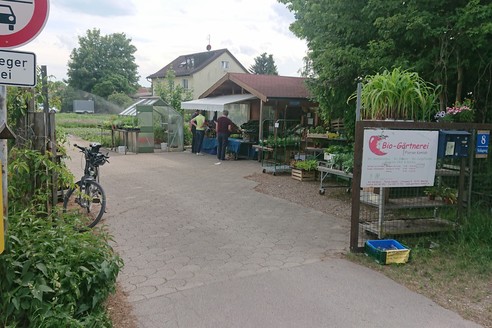
At the Western edge of town, in Pasing the organic market garden of Bio-Gärtnerei Kamlah has a farm shop open on Monday, Wednesday and Friday afternoons. You can not only buy salads and vegetables grown here but also organic seedlings for your balcony or garden patch. The farm has also a market stall at the Pasinger Viktualienmarkt which keeps open all days except Sunday offering a huge selections of organic fruit and veges, but no seedlings.
Tea shops
While coffee is readily available from
loose weight convenience stores, tea drinkers aren't well catered for: Usually you will find some tisanes and one or two types of black tea. Fortunately specialist tea shops still exist, and as they sell loose weight teas by the gram don't be shy and ask them to fill your tea box.
In the
Tee Gschwendner shop in the Asamhof backyard a few meters from the new pedestrian street of Sendlinger Straße this will work as long as the opening of your jar or box is wide enough for the shop assistant to fill it without touching it with her shovel. The franchise also sells conventional fare, so make sure to insist on organic quality – "Bio-Qualität" is the keyword. You'll find a decent selection of both, green, black and herbal teas, with and without aromatics. Bring a little time to stroll through the light and pleasant shop that has been at this place since the 1980ies, ask the assistant to show and suggest teas according to your taste and tell a little detail. When all your teas are filled into your jars you will be asked whether you fancy a tea sample, so it is smart to bring an additional small glass or jar.
Mind you that green tea doesn't store well in classic metal tea boxes as this material supports further oxidation processes.
In spring 2022 it turned out to be difficult to buy loose-weight organic flavoured tea as compliance to the EU regulation 2018/848 on organic products had not been established in time.
Coffee and food to take away
An increasing number of coffee places you may lend a Recup coffee cup for a deposit which you can return at any other shop participating in the retour scheme.
Some like the Neulinger bakeries will even give you a small discount for sparing the environment.
Most of the eateries reviewed here will fill your food into the boxes you provide for take-away as long as you make this clear before they start their usual routine which still means one-way packaging. Sushi to take away is available from Sushiya, and they will happily accept your bento boxes with your order.
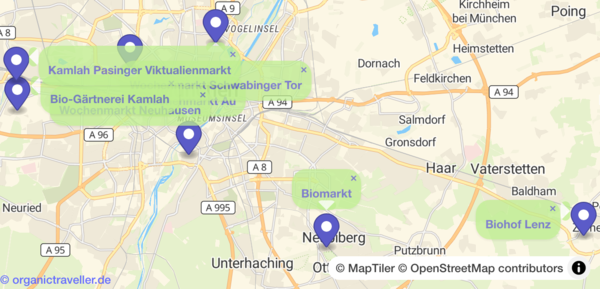
Closed
- Beauty & Nature, Westenrieder Str. 35 (organic fashion, household items and body care, with a range of refill and minimally packaged products; there's a branch left in Leipzig)
- Der plastikfreie Laden, Schlossstr. 7 (Munich's first zero-waste shop, also known as "Plastikfreie Zone", now online only)
- Mutternaturladen, Grünwalder Str. 244
- Mutternaturladen, Tumblinger Str. 45 (inside the Bahnwärter Thiel area
- Ohne, Schellingstr. 42
- Ohne Haidhausen, Rosenheimer Str. 85
- Naturverpacktes Westend Pur, Heimeranstr. 51a
- Evis – ab ins Glas, Pollinger Str. 11, Gilching
- Lela Lose, Freisinger Str. 3, Erding
2025-03-01 14:00:00
[Munich, Neubiberg, Erding, Gilching, Poing, Trudering, Unterfoehring, Wolfratshausen, Zorneding, Leipzig, Au, Haidhausen, Harlaching, Laim, Maxvorstadt, Pasing, Westend, organic, vegetarian, zero_waste, unverpackt, cafe, grocery, market, supermarkets, lunch, bakeries, butcher, tea, bodycare, household, sushi, wine]
[direct link · table of contents]

Wednesday, 22 January 2025
Organic supermarkets can be found on almost every second street corner in Munich but density varies from neighbourhood to neighbourhood.
Organic supermarket chains
In addition to a local organic supermarket chain, Vollcorner (consisting of about twenty markets in Munich and around), Munich hosts several branches of Germany's biggest organic chains Alnatura and Denns (both with more than 10 markets each within the city boundaries). The decline of the Basic chain (see below) which formerly dominated the city centre lead to the opening of a new centrally located Denns supermarket on the premises of a former Lidl branch in May, 2024 (the first Denns supermarket in the city centre did not survive tucked away in the basement of a mall).
Until mid of 2023 Munich was the home of the Basic supermarket chain with 11 markets – early in 2021 this chain restricted its activities to South Germany and Austria and sold all other nation-wide branches. However, these measures
did not stop the decline of the company due to management failures,
resulting in an insolvency. The Munich shops were taken over by the conventional
supermarket chain
teGut. Under the
new management
only the original Basic shop near Isartor and a second one near Nordbad are surviving as organic supermarkets, at least until the end of 2024. After this
grace period the company plans to evaluate whether 100 percent organic supermarkets will be part of their concept.
TeGut was not the first conventional full retailer experimenting with fully organic supermarkets: With the Naturkind supermarket in Harlaching the Edeka co-operative is also running an experimental organic supermarkt in Munich, their first and only in town.
With Basic on the verge, there are two regional full retail chains left in town:
Landmann's with branches in several Bavarian
towns, but only one within the Munich city boundaries, and Vollcorner
which does not have branches outside the Munich S-Bahn network. In addition
you'll still find
many small independent supermarkets, often using a Biomarkt sign, and even some homely, surviving corner shops.
Vollcorner has been making notable efforts to support zero-waste shopping for a long time, and burried many of them due to low customer acceptance. Shopping here you can however be sure not to (indirectly) support huge, globally operating multinational concerns as Vollcorner consistently delists organic brands sold to such companies. So you will find neither Logocos brands (Logona, Lenz, Sante, Heliotrop, Fitne) anymore since the company was bought by L'Oreal (which is partially owned by Nestle), nor Pukka tea (Unilever). Wine-lovers may also collect the corks made from natural cork and return them for recycling at any Vollcorner shop.
On weekdays most organic supermarkets keep open between 9 am and 8 pm, Vollcorner markets open at 8 am. Saturday opening hours vary, the big retailers and Vollcorner close at 8 pm. All groceries except
the Biokultur supermarket in the basement of the central train station are closed on Sundays.
Apart from these full range retailers there is a small local food only chain, not offering any toiletries or detergents: Herrmannsdorfer specialises in meat products, bakery items and beer produced in the Herrmannsdorfer Landwerkstätten in Glonn, somewhat outside Munich. The shops close quite early, but if you come during daytime they stock sufficient dry food, dairy products, fruits, veges, sweets and more to spare you the trip to a second shop. Unlike the Basic chain Herrmannsdorfer allows you to buy meat in your own containers.
In 2015 a branch of the hyped Italian Eataly delicatessen chain opened within the architectonically interesting glass and iron construction of Schrannenhalle near Viktualienmarkt. It's true, they offer a good range of organic products, and organic food items are labelled as such on the shelves, but it's nevertheless a disappointing experience: Almost no fresh organic fruit and veges (not even the fresh herbs are organic), only pre-packaged organic meat (forget about the well-assorted meat counter), and the organic wines and spirits in the basement are not marked "bio" on the shelves, so it's very hard to find them.
Independent full-retailers
If you want to support the local economy, both Vollcorner and Herrmannsdorfer shops are all fine, but you may prefer to support independent markets where the owners are actually running the stores and create a homely and personal atmosphere. Often you will find products not on sale by the big chains.
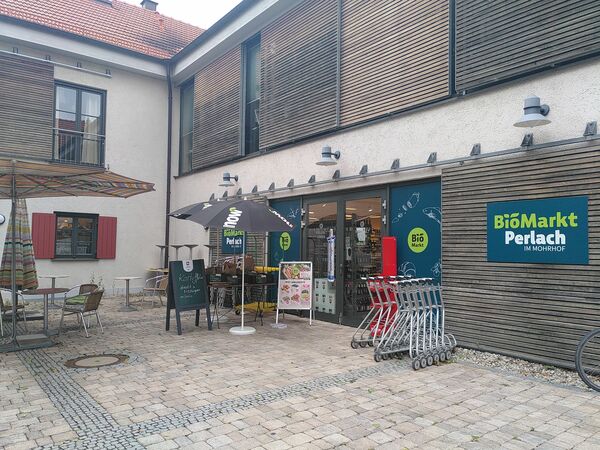
When traditional Grüner Markt chain closed down end of September 2014, their main house in the Altperlach neighbourhood made an exception. Housed in a vault it has a pleasant italophilic, somewhat venerable atmosphere, definitely worth a visit. The perfect surroundings when shopping for delicatessen, and a must-go during the Christmas season. It's now dubbed Mohrhof Perlach.
The other big independent is Schmatz ("smack") in the Glockenbach neighbourhood. Step by if only for the lovely decoration of their bodycare section. Kids are invited to play in an old-fashioned corner shop, and selected items are lovingly set on display. It's the only organic supermarket playing music in the background. By the end of 2018 they issued a ban on fresh herbs in plastics packing, and in 2022 there's a dedicated unpackaged shelf with dry food in deposit glasses.
For the picturesque yet upmarket farmshop feeling in the city aim for Stemmerhof on top of the Sendlinger Berg. Once upon a time a wealthy village farm opposite the village church the nicely restored houses are now the home of an organic supermarket and a range of small owner-run shops. The supermarket's butcher's cum delicatessen disk will happily sell lunch snacks to eat on the spot or to take-away. The same enterprise also runs a second branch in the suburb of Grünwald, just a street crossing opposite of Alter Wirt hotel and restaurant.
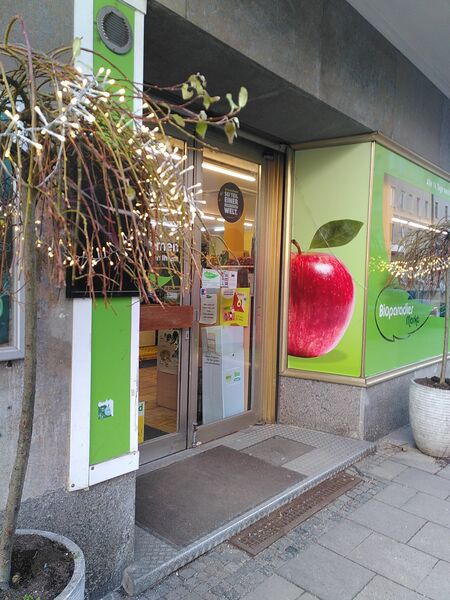
In the posh Lehel neighbourhood near the Eisbach river within the Englischer Garten park you'll find an independent organic supermarket with a touch of a spice and greens bazaar, the Bioparadies Biomarkt. Its friendly staff was even willing to open after closing time, to sell me a left-over bread on a Saturday afternoon. The serviced bakery and cheese counter is also the place to refill your spice jars with loose-weight herbs and spices. The supermarket is conveniently located opposite the tram stop "Paradiesstraße".
The former Erdgarten supermarket a ten-minutes walk away from Pasing train station (or two minutes from Pasing Marienplatz square) reopened as a branch of the local Vollcorner chain September, 2019 and continues to serve organic and vegetarian wholefood lunch as well as coffee and cake. They also have a nicely decorated bodycare section. Whether they'll continue to serve knitters with a fine selection of organic wool I am not aware of.
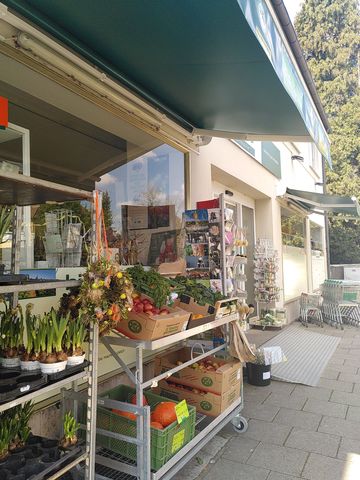
If you by chance happen to strand near the Klinikum Harlaching hospital, don't dispair: two tramstops in North-Eastern direction on the left side (just follow the tram line along Grünwalder Str.) you'll find Biowelt, a crammed independent organic supermarket with a superb selection of both, bodycare and frozen convenience products: All you need if visiting a friend or relative in the hospital in urgent need of a proper meal. Starting with lunch time they offer a helping of organic soup and a small selection of snacks. You may ask for a sandwich made on the spot. The shop also has a zero waste corner with dispensers for legumes and a small selection of other dry food as well as an assortment of dried fruit. Make sure to step by check-out to weigh your containers before you fill them.
Attending a conference at one of the huge Bogenhausen hotels near Effnerplatz? Your lunch break should be sufficient to follow Bülowstraße in Western direction to Herkomerplatz. Here you'll find not only a Herrmannsdorfer butcher's shop cum grocery cum eatery and the Hofpfisterei bakery branch next to it, but also a pleasant family-owned organic supermarket dubbed Biovolet. The Riemensberger family placed some bar tables in the entrance area to have a snack, and there is a second branch in Eching (formerly a Grüner Markt branch). Pay with your EC (VPay) debit card, and they donate a few cent to the BioBoden co-operative which buys farm land in order to lease it to organic farmers. On Thursdays you will receive a 10 percent discount if your shopping cart is worth more than 50 euros.
In the neighbourhood of Schwabing one of the oldest organic groceries in town is located, these days rather boringly dubbed Echt Bio Markt which is the brand of a network of small-scale independent organic supermarkets. The pleasant, traditional shop in Tengstraße offers refill for organic household detergents.
However. not all supermarkets of this brand have been long established: The independent owner-run Echt Bio Markt in Nymphenburg was opened during the lock-down of the covid-19 pandemic: As its name suggests
Bio am Romanplatz is the perfect place
to shop for provisions at the tram hub at Romanplatz.
There's only one Sunday-open organic supermarket in Munich, the Biokultur in the basement of the main train station. It's sister branch in the newly developed neighbourhood of Riem on the plot of the former Munich airport can be found inside the
Riem Arcaden shopping mall, sporting the only organic cafe in the neighbourhood. Unfortunately neither the cafe nor the supermarket are open on Sundays or public holidays.
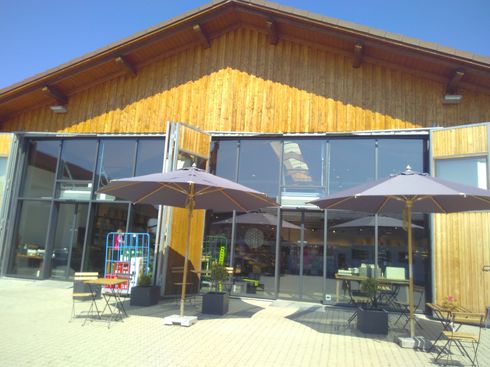
If you happen to take the S7 urban train in southern direction to the municipality of Höhenkirchen-Siegertsbrunn take the time to visit Roberts Bio-Genussmarkt on the premises of a former farmyard. The spacious, pleasantly refurbished and nicely decorated barn with its dark wooden shelfs makes it easy to spend some time on a coffee and cake in the included cafe area. When the weather is nice sun-shaded outdoor seating is provided. The former village of Höhenkirchen is part of the Mangfall bicycle route from Munich to Rosenheim, and this is a pleasant place for a break.
Waste-free supermarkets
By 2016 the first wrapping free supermarket made it into town: Check the zero-waste post for reviews.
Co-operatives with membership schemes
In the 1970ies and 1980ies many organic neighbourhood shops in Western Germany were co-operatively organised and sold to members only. In the 1990ies most of the surviving shops like the "Abakus" in Bremen opened to the general public, with discount schemes for members. To my knowledge, there's no such surviving shop in Munich, but recently established co-operatives such as "Deine Alternative" in Zorneding continue this inclusive approach.
As community supported agriculture (CSA) has an increasing appeal to city dwellers (the biggest one in Munich is the Kartoffelkombinat), the concept of an organic supermarket for members only came back to town in 2016, with
the Ökoesel ("eco donkey"), by now a small, yet full-fledged organic supermarket
in Nymphenburg near Leonrodplatz, focussing on
package-free food.
When the founders of Munich's oldest organic
supermarket, Lebascha in Haidhausen,
were to pass over the shop to a younger generation in summer 2022, the Ökoesel folks stepped in. Although both branches focus on a membership scheme, they are neighbourhood groceries open to everyone. As a non-member you'll simply pay non-subsidised (i.e. higher) prices.
In
summer 2021, another approach followed with the establishment of the Foodhub co-operative in Giesing, next to the lovely cafe "Shotgun Sister" and an organic bakery shop.
If you live in the vicinity you may consider joining this special organic food co-op which runs on the principle of solidarity: every member works three hours per month for or in the project and what's sold in the supermarket (predominantly regional produce) is decided democratically by its members. The shop concentrates on pre-packaged food, household and toiletry items, with the exception of loose weight fruits and veges, a small number of dry food gravity bins offering grains and nuts, and the self-service bread and rolls section. The household cleaning and bodycare shelves are filled with products in environmentally friendly packaging and focus on re-use (like the bamboo paper kitchen paper which can be washed and thus used several times) or little packaging through bigger volumes. There are plans for a zero-waste station to refill cleaning agents.
When I visited the shop at their open day in autumn 2021 I was surprised to not find a serviced fresh food counter given the fact that Karl Schweisfurt of Herrmannsdorfer Landwerkstätten is one of the three legal heads of the co-operative, most likely due to the fact that such a counter needs to be staffed.
No membership fee is required for becoming a member of the on-line market platform Marktschwärmer.
There's a
Marktschwärmerei pick-up hub in the neighbourhood of Milbertshofen. If you decide to join, you can order food, beverages, sweets and more from predominantly organic producers in and around Munich.
Formerly organic supermarkets
As part of the "teGut" chain the following, former "Basic" supermarkets still offer a reduced assortment of organic products:
- teGut Bogenhausen, Richard-Strauss-Str. 48, Mon–Sat 8–20
- teGut Neuhausen, Nymphenburger Str. 82, Mon–Sat 8–20
- teGut Laim, Agnes-Bernauer-Str. 73, Mon–Sat 8–20
- teGut Altstadt, Müllerstr. 45, Mon–Sat 7–20
- teGut Neuperlach, Thomas-Dehler-Str. 45, Mon–Sat 7–20
- teGut Ludwigsvorstadt, Luitpoldstr. 3, Mon–Sat 7–20
- teGut Schwabing, Belgradstr. 59, Mon–Sat 7–20
- teGut Victoriaviertel, Rheinstr. 1, Mon–Sat 8–20
Closed down
The following organic supermarkets do no longer exist although you will still find references to them on the web:
- Alnatura Innenstadt, Sonnenstr. 23
- Alnatura Aschheim, Theodor-Fontane-Str. 10, Aschheim
- Biochicco, Ohlmüllerstr. 19 corner Zeppelinstr.
- Biomarkt CM, Schlüsselbergstr. 13 (Berg am Laim)
- Denns w/in Hofstatt mall, Sendlinger Str. 12a, basement (city centre)
- Die Bio-Bäuerin, Peter-Wolfram-Str. 31 (Gronsdorf)
- Entenbach Naturkost,
Schlotthauerstr. 16
- Johannisgarten Naturkost, Johannisplatz 21 (Haidhausen)
- Gut zum Leben, Motorama Ladenstadt, Rosenheimer Str. 30-32 (Haidhausen)
- Tagwerk-Bioladen Hofgut Riem, Isarlandstr. 1 (Riem)
- Marktschwärmerei Werksviertel, c/o Cafe Guatemuc, Atelierstr. 1
- Nicos Naturkost, Kazmairstr. 38
- Veganz, Baldestr. 21 corner Auenstr., including self-service cafe Goodies
- Radix, Thalkirchner Str. 88 (Isarvorstadt)
- Vollcorner Ludwigsvorstadt, Lindwurmstr. 80
2025-01-22 14:00:00
[Munich, Au, Bogenhausen, Haidhausen, Harlaching, Lehel, Maxvorstadt, Nymphenburg, Schwabing, Pasing, Aschheim, Hoehenkirchen-Siegertsbrunn, Englischer_Garten, Mangfallradweg, Mangfall_cycle_route, organic, supermarkets, grocery, lunch, snacks, deli, Italian, CSA]
[direct link · table of contents]

Friday, 03 January 2025
A university city and a cultural hotspot in Norway it does not come as a surprise that Trondheim has a number of places to source
organic and eco-conscious products. However,
although the availability of organic products had been increasing
in the years before the covid-19 pandemics, the political will to foster planet-friendly consumation is low. As a consequence it requires a lot of individual effort to plan every-day life in the city if you want to restrict yourself to organic and sustainable food and goods.
Many inhabitants get some of their organic groceries (if omnivore also their meat) from market gardens, community-supported agriculture or farm subscription schemes, but since I do not live here this is beyond the focus of this blog.
Organic groceries and general stores
There's only one all-organic grocery left in town, and a farmer's shop offsite the usual tourist tracks, both crammed and pleasant if you like small owner-run shops, with friendly shop assistants who usually have time for a chat. Both of them have been here for many years, with ups and downs, sometimes at the edge of bankruptcy. You may expect to find all types of dry and a good selection of canned food, all you need to fill your store cupboard, sweets, natural body care and sustainable cleaning products. If available fresh fruits and vegetables are not pre-packaged in plastics.

For fresh food head for the city's organic pioneer, the Helios convenience store in Prinsens gate. At the end of 2016 the shop closed down but was taken over by new owners immediately and is now as reliable as before. You will find all daily necessities – food, toiletry, detergents etc. – in organic quality, including frozen pizza, ice-cream, unhomogenised fresh milk and Norwegian caramelized brown cheese. The frozen "lefser", Norwegian "pancakes" topped with butter, cinnamon and sugar and folded together, are not organic but nevertheless worth trying – simply defrost and enjoy.
Outside the city centre, a few minutes from the Rotvoll trainstation,
you find a small organic farm shop cum general store, the
Rotvoll Landhandel. It's part of the antroposophically driven Camphill village and biodynamic farm, an inclusive project of people with and without disabilities. The shop in a small farm house with light and wooden interior does not only sell products produced on the farm (among others tasty organic juices, cookies, bread and textiles), but also offers all you need of organic dry food, sweets and preserves, both of Nordic, European and international origin as well as detergents and body care. There's a freezer with bread and rolls of the village bakery and a fridge with dairy products, occasionally also meat. During the harvest season there may be fresh organic vegetables, too.
Make sure to have sufficient cash with you as the card reader refuses cards issued by foreign banks (at least none of mine were accepted, an issue often experienced in smaller shops in Norway, probably due to a
restricted service subscription).
Farmers' market
At Trondhjem torv a farmers' market, Bondens marked is being held every second week on Saturday. Local small scale farmers sell their produce, but it takes a little effort to find the organic ones.
Bakeries
None of the above mentioned organic groceries are what you would call economic success stories, some of them were even about to shut down in the past. Likely the biggest economic success in the Norwegian organic sector is Godt Brød, a bakery which started here in town, as of today with three cafes cum bread shops in town. There's also a artisanal bakery, Isaks, attached to Sellanraa bar using organic ingredients.
Organic food at conventional food retailers
In conventional supermarkets you cannot expect to find all you need in organic quality, usually you will have to shop in different supermarkets and see what you are able to buy. Moreover organic vegetables are often wrapped in plastics, to
separate them from conventual produce.
At the beginning of the century
the (now) Meny hypermarket Solsiden offered an impressive range of organically certified food seen with Norwegian eyes. However, there has not been any noteworthy increase for the past years, and there's no effort to guide you towards organic products.
In Coop supermarkets watch out for the Änglamark own brand (see also here), in Rema shops for Kolonihagen, but most supermarkets do not stock more than a very basic selection, with the notable exception of Coop Mega shops like the one in the Sirkus shopping mall at the Strindheim bus hub where I found such exotic products as organic aubergines, cream, not homogenised milk and lime.
To avoid green-washed products and misleading marketing while cherry-picking through supermarkets check for the "økologisk" keyword and organic labelling (mainly Debio, KRAV and the European organic label, but you will also find Soil Association and USDA certificates). Dairy products by Røros meieriet, meat products by Grødstad Gris (though no longer certified organic as this decreased their ability to sell their products), ice-cream and beer from Reins Kloster, "Helios" and "Manna" products as well as "Go green" grains and pulses are all safe. Some of them can also be found in Sunkost or Life healthfood shops.
Permanently closed
Before the covid-19 pandemics there were two cosy special shops offering organic
body care and wool products, but unfortunately none of them survived. Neither did the city's ethical and zero-waste pioneer Etikken, later known as Zana which was run as non-profit association.
2025-01-03 15:35:00
[Trondheim, organic, fair, vegetarian, vegan, grocery, market, supermarkets]
[direct link · table of contents]

Friday, 27 September 2024
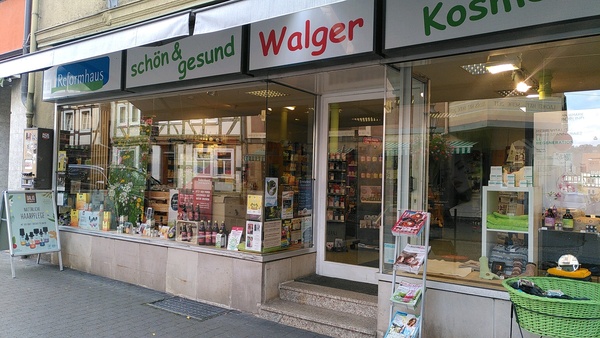
As almost all West-German small towns with an intact historic centre Witzenhausen has both, a health food shop in the tradition of the Lebensreform movement at the beginning of the 20th century (the
Reformhaus "Schön und gesund"), and
a Weltladen fair-trade shop driven by volunteers.
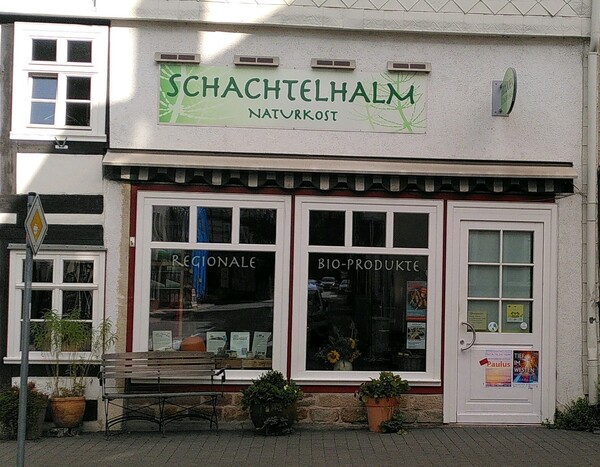
But there's also a traditional organic corner shop offering all you need for food, household, hygiene and recreational treats: the
Schachtelhalm (German for "horsetail", the plant). Unfortunately I arrived too late a Saturday to catch more than a glimpse from the outside.
The local brewery, Schinkel, a start-up of the university milieu, was Hesse's first organic brewery, but to date only a few of their beers are certified organic. You can get (and taste) them at the brewery's own salespoint,
Schinkels Biershop.
Unterrieden
If you come to Witzenhausen on the Werratalradweg from Bad Sooden-Allendorf the bicycle route is running through the village Unterrieden, a part of Witzenhausen on the Eastern side of the river Werra right before the river turns to the West. On the main road through Unterrieden, the Ludwigsteinstraße, you'll find no less than three farm shops, described here from South to North.
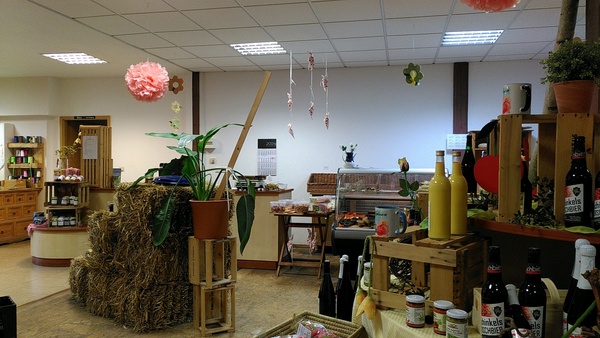
The farm shop of the
Absatzgenossenschaft Unterrieden (AGU), a co-operative of both, organic and conventional farms in the village famous for its cherries, offers a wide range of locally produced food and beverages: fresh greens, sausages, cheese, bread, honey, preserves, fruit juices, wines and spirits. Only a fraction of it is organically certified, and unfortunately you cannot tell how much inorganic fertilisers and poisonous pest control has been used to produce products missing a certificate. When I asked about bread and rolls the shop keeper told me that the bakery had been organic in the past, but since the baker retired the products have been coming from the only remaining artisanal bakery in town. Some of the (fruit) wines and honey definitely sport the European organic label.
The AGU shop also stocks organic jams and spreads of
Knofi & so ("garlic and such") in very small glasses, perfect as a small gift. The label belongs to a community of passionate market gardeners with a focus on direct trade. They are operating a small manufactory and market boothes. The one in Ludwigsteinstraße is unmanned, with an honesty box to put your money in. When I was there in August there were lovely tomatoes, but when I returned in September the booth was temporarily put down, so I suspect it is there only when excess greens are available. The "Knofis" also offer basic guest rooms for cyclists and backpackers.
Poultry lovers must not miss the poultry butcher's shop
Frischgeflügel Roth. Unfortunately the shop is open only two days a week and was on vacation when I was there, so the vending machine in front of the shop was empty, too. The butcher co-operates with almost all organic poultry farms in the region.
2024-09-27 16:00:00
[Witzenhausen, Werratalradweg, organic, fair, coffee, supermarkets, grocery, accommodation, breweries, butcher, farms]
[direct link · table of contents]

Thursday, 26 September 2024
While thriving during the covid-19 pandemics, package-free supermarkets have been facing hard times thereafter, and in big cities with high rents we've seen a wave of shop closings.
Even the beautiful grocery Wunderbar unverpackt ("Wonderfully devoid of packaging") which opened in May 2018 wasn't able to survive and closed for good in 2023.
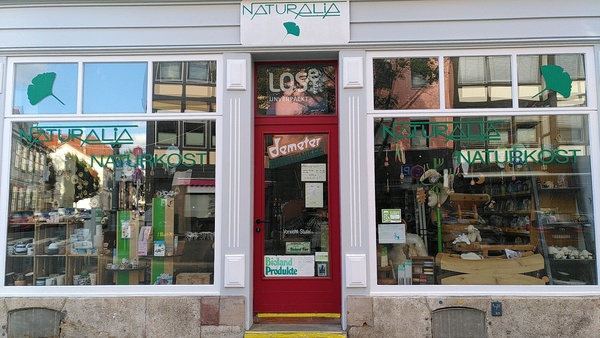
To refill dry food supplies from gravity bins pay a visit to the Naturalia grocery at Wöhlerplatz, a traditional crammed organic corner shop which offers a small assortment of dry food (pasta, cereals, nuts, rice and the like) in self-service dispensers. Apart from this eggs, bakery items, fruits, veges and cheese can be taken home in your own jars and bags. In addition the place is also a tea shop – so bring your tea boxes for refill. If you stay in town for a longer period of time consider to collect stamps on the Göttingen Climate Card ("Klima-Karte") here each time you use your own bag or box. When you collect 16 stamps from a number of (not necessarily organic) shops, market boothes and restaurants in town you will be rewarded with a climate-positive goodie bag and earn support for climate projects in town.
The shop-keeper seems to run a small farm herself as she asks for apologies in case she'd appear in the shop past 10 am, to help sheep giving birth.
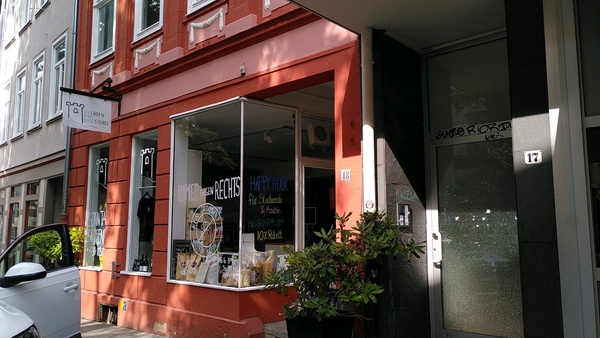
The second organic grocery to collect Climate Card stamps from is the Bioladen an der Burgstraße, a dedicated anti-fascist neighbourhood grocery next to Cafe Inti. A few years ago this cosy full-retailer replaced a
branch of an organic bakery based in Klein Lengden with shops both there and in Göttingen, delivering to many organic markets in the greater region. The Sunday-open place has the air of a traditional organic corner shop and makes an extra effort to offer products packaged in returnable glasses, among others wine gums. More liquorice and jellies can be bought by the piece, and together with the cheese and bakery counter (which fills about half of the entire location), the racks with fruit and veges and the dairy products and drinks in deposit glasses and bottles my estimate is that more than half of the goods can be bought without disposable packaging. You can fetch a coffee in your own mug or a deposit cup.
The shop also has an innovative approach to keep away wasps from ripe fruits: small trays filled with over-ripe fruit juice on a window sill a little apart from the entrance attract the insects which are occupied there as long as you don't disturb them.
The second and much larger organic supermarket in the inner city belongs to the
Alnatura chain. Although it doesn't have an explicit focus on zero waste the staff at the bakery cum cheese counter is happy when you come with your own boxes and bags, and there's a good selection of products in deposit glasses and bottles. There are no cafe tables and chairs, but you can take out coffee drinks and tea (in deposit mugs) and choose from a great selection of sandwiches. Even in the evening hours you will usually still find a sandwich.
Geismar and Diemarden
The Gemüseladen in the Western suburb of Geismar, near the church of St. Martin, is not participating in the Klima-Karte scheme. However, this organic greengrocery is offering an abundance of regional produce which you can take home in your own bags.
On the other side of the street you'll find
Le Bol, a bio-dynamic organic French-German artisanal sourdough bakery – according to locals making the best bread in town. Needless to say that you can come with your own bag and that the bread keeps fresh much longer than ordinary fare. Given that the baker has to rise early so you can have fresh bread in the morning, opening hours are restricted to the morning ihours except on Thursdays.
If you are on a bike tour or stay in town a little longer consider a visit to the
Naturmilchhof Gartetal organic dairy farm. To get their continue from Geismar to the village of Diemarden about four to five kilometres away. Buying fresh milk, oat drink, yogurt, kefir or cheeses from the farm's own dairy is unfortunately somewhat inconvenient as you must register at the farm's web shop to use their self-service farmshop guarded by surveillance cameras. Then you would use the computer inside the shop to register your purchase, and your debt will be detracted from your bank account. I haven't checked whether this works with any European bank account. All liquid and semi-liquid products come in returnable plastic bottles and jars with a deposit. The shop is closed on Sundays and public holidays.
Non-food
Household items supporting a package-free lifestyle can be found at the factory outlet of the eco postal order shop Waschbär near Geismartor. Here you may also refill cleaning agents, liquid soap and detergents to get a stamp on your Climate Card. Unfortunately the shop is going to close for good by the end of October, 2024.
Tea
In the 1990ies owner-driven tea shops offering a great selection of loose-weight teas, herbal and fruit blends were quite a thing, and fortunately they have been surviving in Göttingen so far. With the years, their assortment of organic teas has increased, and I haven't found one who refused to fill my tea boxes (even though you may ask for it verbosely).
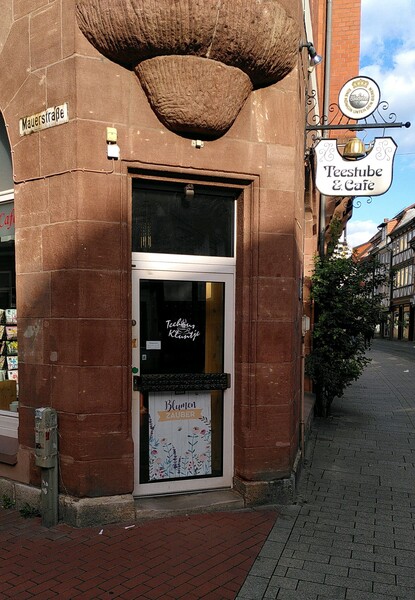
The
Teehaus Kluntje isn't just a nice shop for teas and everything you need for tea ceremonies or small recreational everyday tea breaks, it also serves you a good cup of tea. However, it's a bit too focused on being a gift shop if you prefer tea shops with a reduced atmosphere.
Personally I prefer the wooden interior
of Teehaus Schmidt
which nicely brings out the timber frames of the old house. Here the focus is clearly on tea and spices. An interesting fact: The place was a students' start-up in the 1970ies.
In a city with as many tea lovers you won't be surprised to find a branch of the
Tee Gschwendner franchise. Just like other franchises of this brand they sell more conventional than organic teas, but the shop assistants will show the right types when you ask for "bee-o" (bio) teas and place your tea box on the till.
Fortunately Göttingen still has many cosy carefully curated owner-driven shops. When I tried to visit the traditional confectioners' shop cum delicatessen
Alfred Ewert on recommendation by locals it was too late to find it open, and the products on display in the shop's windows weren't organic. So I decided not to list it here. However, pink@norden.social recommended it as a veritable loose tea shop, so I suggest that you pay a visit and check for organic labels and the "bio" keyword.
Closed
2024-09-26 13:30:00
[Goettingen, Geismar, organic, vegetarian, zero_waste, unverpackt, grocery, supermarkets, bodycare, household, tea, bakeries, sunday_open, farms]
[direct link · table of contents]





















